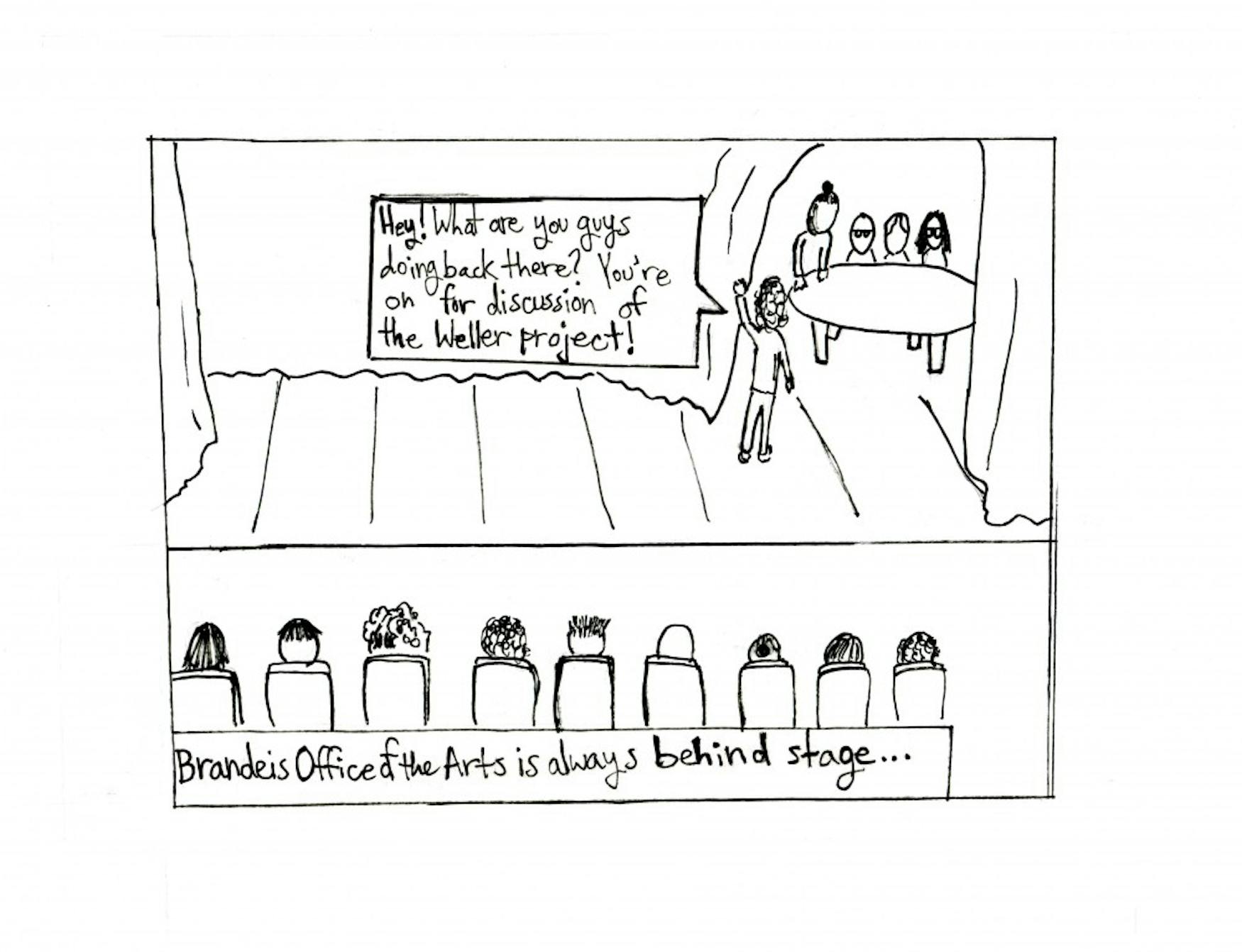EDITORIAL: Suggest changes surrounding the Creative Arts Award
Two years ago, the University revived its interdepartmental Creative Arts Award after a two-decade hiatus, naming soprano vocalist Tony Arnold the 2015 recipient. The award is given out every two years, and this year, the University selected playwright Michael Weller ’65 — whose credits include his 1971 play “Moonchildren” and the 1979 film “Hair” — as the 2017 recipient. As part of his resulting yearlong residency at Brandeis, Weller wrote “Buyer Beware,” a play about a fictional Brandeis student’s attempt to perform a comedy show in the style of Lenny Bruce.
During the drafting and revising process, Brandeis students expressed concerns about the play’s content, particularly its oversimplified depiction of complex racial issues, its offensive portrayal of people of color and its conclusion, in which a white student escapes consequences for his actions. Following private meetings between Weller and faculty members, the Department of Theater Arts canceled the Brandeis production of “Buyer Beware,” which is now set to premiere in a professional venue instead, according to department chair Susan Dibble.
This board recognizes the importance of University responsiveness to student concerns; receiving criticism with an open mind and seeking ways to improve are essential qualities for any institution, especially one of higher education. However, this board disapproves of how the University handled this incident, overall.
Brandeis’ lack of transparency throughout the entire situation — both during the closed-door meetings and after the conflict’s resolution — is unacceptable. Deliberations regarding the fate of the play occurred behind closed doors, without input from the larger University community. Consequently, Brandeis did its students a disservice by skipping an opportunity to provide a forum for open, productive discussion on the play’s controversial themes. Many of these themes are relevant and present in students’ minds, but by quietly canceling the play, the University failed to give the larger student body a chance to be heard. Given the Task Force for Free Expression’s stated intent to work openly with the Brandeis community and its ongoing efforts to finalize its free speech principles, the University’s failure to engage the community in the significant free-speech debate posed by “Buyer Beware” strikes this board as hypocritical and discouraging.
Additionally, the Creative Arts Award is meant to highlight the University’s “commitment to engaging with the arts as an opportunity for discovery, creativity and innovation across traditional disciplinary boundaries,” according to the award’s website. However, the University’s response to “Buyer Beware” was inconsistent with its purported goals: Brandeis failed to adequately engage with the arts and suppressed any chance for intellectual discovery, instead opting to sweep the problem under the rug. By reacting in this way, the University effectively halted discussion of the larger societal issues reflected within the play before the majority of the Brandeis community even had a chance to contend with the material — let alone form an opinion on it.
None of this is to say that the University should not have responded to students’ concerns but rather that it should have responded differently. Instead of canceling the Brandeis production of “Buyer Beware,” the University should have provided students an opportunity to voice their concerns publicly, in a venue where they could be heard by the playwright himself. Hosting a post-production Q&A session with the playwright would have given students a chance to challenge Weller directly on the content of “Buyer Beware” and could have shown him the adverse effects his work had on some students. Additionally, a public conversation like a Q&A would allow students to be heard not only by Weller but also by their fellow students. This gives students a chance to express concerns about potentially controversial material and have the added benefit of upholding the University’s stated commitment to engage with art. In the case of “Buyer Beware,” while a conversation with Weller may not have necessarily altered his opinion on the views reflected in “Buyer Beware,” students who spoke at such a Q&A session might have been able to persuade fellow audience members, thus having a greater impact on the student body at large.
In Justice Louis Brandeis’ concurrence in the 1927 Whitney v. California Supreme Court decision, the University’s namesake wrote that “freedom to think as you will and to speak as you think are means indispensable to the discovery and spread of political truth; that, without free speech and assembly, discussion would be futile; that, with them, discussion affords ordinarily adequate protection against the dissemination of noxious doctrine; that the greatest menace to freedom is an inert people; that public discussion is a political duty.” As such, the opportunity to participate in an educational discussion on the controversial themes in the play would prove more beneficial in the long run.
Finally, the execution of the Creative Arts Award warrants some revision. In future years, this board recommends that Brandeis refrain from canceling the resulting artwork due to its content, with the condition that creators agree to participate in a post-production Q&A in order to hear and respond to any concerns provoked by their work.




Please note All comments are eligible for publication in The Justice.